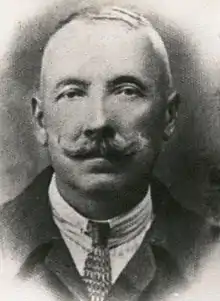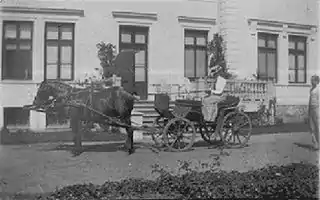Antonina Alfreda and Bolesław Pietraszek | |
|---|---|
 Bolesław Pietraszek | |
| Died | 1 January 1965 |
| Nationality | |
| Honours | Righteous Among the Nations |
| Righteous Among the Nations |
|---|
 |
| By country |
Alfreda and Bolesław Pietraszek (both died 1 January 1965 in Jabłonna Lacka)[1] were a Polish husband and wife who sheltered several Jewish families consisting of 18 people during the Nazi German occupation of Poland in World War II. They were posthumously bestowed the titles of Righteous Among the Nations by Yad Vashem in September 2007. The medals and a diploma were presented by the Israeli vice-ambassador in Poland, Yossef Levy, to their two surviving cousins, Zofia Panfil and Jolanta Okulicz-Kozaryn from Olsztyn. In his speech, Yossef Levy said. "We have the utmost respect for those who risked their lives to save Jews under the threat of death. The rescued will never forget the rescuers."

Alfreda was a well-educated woman, who spoke four languages including German, which was very helpful during the war, when she had to prevent the Nazi Germans from searching through their property. Her husband was raised with a patriotic spirit; his father participated in the January Uprising at the age of 17, and his brother Marian died as a volunteer in the Polish-Soviet War.[2] Their birthdates are unknown, it has only been established that they were married in 1920. According to the testimony of their relative, Jolanta Okulicz-Kozaryn, their decision to hide the Jews was a conscious one.[2] During the war, Alfreda and Bolesław Pietraszek, a childless couple — both 60 years old — lived on a farm in Ceranów village (pictured) in Sokołów County in east-central Poland. For two years, around their farm, they harbored several Jewish families consisting of 18 people: hiding in their barn, in their basements, and in pig pens.
Collective rescue
To feed the people they sheltered, Alfreda and Bolesław Pietraszek relied on assistance from their neighbors and other inhabitants of the village.[2][3] The rescuers and the rescued were never betrayed, and only one person did not survive — a child — smothered by his own mother with a pillow in order to stop the crying when the German patrol was in the house.[3] "Even now, I can't quite believe this was a true story regardless of how well documented it is" — said Grażyna Panfil-Rogińska, daughter of Zofia Panfil, remembering the telephone call from the elated Bencion Sela from Israel — "he was so moved. Until today, over his own bed he has a portrait of his savior. He sent it to me via email" — she said. Rogińska received a call also from Szaul Kopyto living in Washington, who confessed that he kept silent for years only because he needed to forget the experience.
The Jews, harbored by Pietraszek couple between 1941–1943 managed to escape from the ghetto in nearby Sokołów Podlaski, a home to a large population of Jews before the invasion. The ghetto was eventually liquidated by the Nazis with all its inhabitants sent to Treblinka extermination camp. Among those rescued was the whole family of Bencian Sela (his name also spelled as Ben Cjon Sela) including his grandparents. Sela's family, after the war, wanted to present the Pietraszeks with gold and other valuables, but the Poles refused saying that the Selas would need it more.[4]
After the war, the Pietraszeks lost most of their 100-hectare farm to an agrarian reform in the new communist Poland. The couple was eventually forced to leave the village after being subjected to over two dozen assaults and robberies. Local thieves, aware that the couple had sheltered Jews on their property, believed that there were Jewish valuables there, unaware that Pietraszeks refused any financial help from the rescued. Bolesław Pietraszek was injured by a hand grenade in one of the assaults. They both died in abject poverty in 1965.[4]
The ceremony at which the Yad Vashem titles were granted to Alfreda and Bolesław Pietraszek took place during the inauguration of the Festival of the Jewish Culture in Olsztyn, popularized by Gazeta Wyborcza and other Polish media.
References
- ↑ "Historia pomocy - Rodzina Pietraszków | Polscy Sprawiedliwi". sprawiedliwi.org.pl (in Polish). Retrieved 2019-08-22.
- 1 2 3 Alfreda i Boleslaw Pietraszkowie, Webpage of the Treblinka Concentration Camp Museum
- 1 2 (in Polish) "Odznaczenia dla Sprawiedliwych," Magazyn Internetowy Forum Archived 2009-07-19 at the Wayback Machine September 26, 2007.
- 1 2 (in Polish) Alfreda and Boleslaw Pietraszek, Treblinka Concentration Camp Museum
External links
- Alfreda and Bolesław Pietraszek – their activity to save Jews' lives during the Holocaust, at Yad Vashem website
- Ceranów, the town, official webpage
- Map of the area via mapa.szukacz.pl